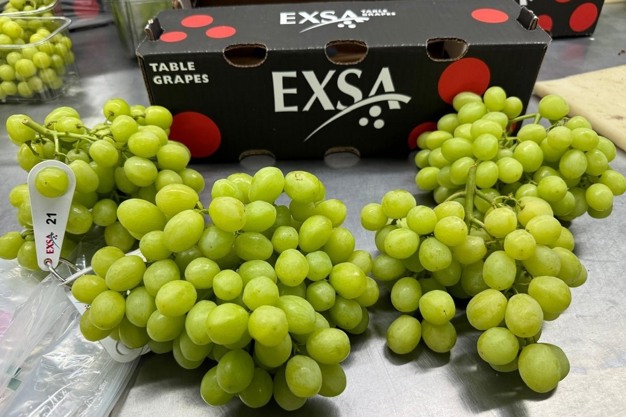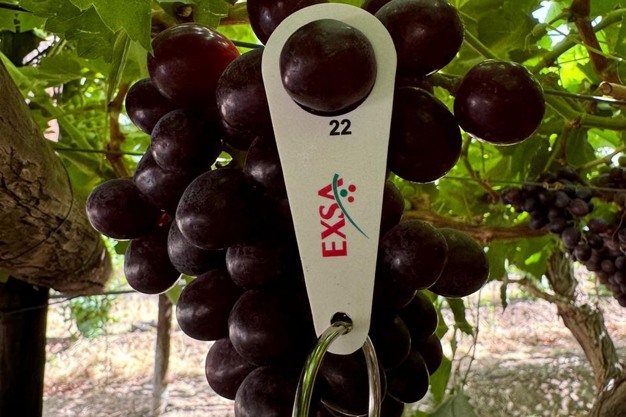As the European, UK and Middle Eastern table grape markets empty ahead of Christmas, South Africa is experiencing a slow start to their season. According to Nico Louw, Head of Marketing at Exsa, a Paarl-based exporter, "We at Exsa are in the same boat as many others in the industry; unfortunately the season is off to a slow start. The Brix, especially of white grapes, is taking longer to pick up than usual. In Namibia, we started packing two days later than last year, which means we lose five to seven containers a day that is approximately 14 potential clients which could have received more product."

"In the Orange River growing area, specifically in the sub-regions of Keimoes and Kakamas, the producers are packing more than a week later this year. We struggled for more than three days to pack just two containers, due to a stop-start situation caused by the low Brix. Week 50 should, however, kick off with good volumes in this area," notes Louw.
Airfreight to fill market gap
He reports that the high demand and shortages currently experienced in the markets have made it possible for them to airfreight grapes, but capacity is lacking: "We were able to send some airfreight, but it was still an immense struggle, as was likely experienced by many others as well. Last week we packed sufficient volumes and had them ready for loading, but securing airfreight proved to be a great challenge – there was simply no availability. We export grapes to UK supermarkets specifically via airfreight. This past Saturday and Sunday the space we had secured on flights was cancelled at the last minute, and we only managed to export about two-thirds of the grapes, which were flew out on Monday night. This highlights the extent of the grape shortage, and due to the high demand, the direct flights to the UK are fully booked. We have approached several different airlines, depending on availability, to secure any space that they have."
Louw adds that some farms in the Orange River region have reported a decrease in volumes for the early grape varieties: "We only started harvesting our Prime in the Vioolsdrift area last week Monday, and the results are promising, with a good crop, especially in terms of sizing. This gives us the opportunity to also pack for our trading markets, such as those in Indonesia, Malaysia and Canada".
Namibia shows lower grape volumes
Regarding red grapes, Louw reports a sudden shortage: "Namibia is showing lower volumes of Prime and Early Sweet. We have packed almost 70% of the Namibian grapes; only Arra 15, Arra 14, Sweet Globe and Sweet Celebration remain to be packed. We will start packing our first Sweet Globe from Namibia this coming Monday. Red grapes are unfortunately very limited at the moment, and I would estimate that there will be a shortage in South Africa for the next two weeks. In Week 50, Exsa will begin packing certain red varieties from Trawal, but we estimate limited volume on Flame and Arra29. From Week 51, more volume will come into play, and in week 52 Sweet Celebration volumes will begin to increase. The shortages and lighter crops reflect a similar situation in other grape-growing regions, such as California, which ended production earlier, as well as Spain and Italy. The market, however, remains relatively empty, as not many grapes have arrived early. The first ships from South Africa will arrive abroad at the end of this week and early next week, but not many grapes will be on shelves this week, unfortunately. The market will be empty; there will not be many grapes before Christmas, and with the slow start of production around the Orange River we also do not expect large volumes directly immediately after Christmas, particularly in red varieties."

High market prices
According to Louw, the pricing levels in the market are currently favourable for exporters: "I believe the prices will remain favourable until the mid-January arrivals, but it all depends on sales. There are not many grapes to sell, so prices remain high. Supermarkets are currently paying a premium for airfreight just to keep some product on the shelves. I guess we will see how it all plays out this coming year. Currently, we are not sending any grapes to the Far East, as there is still an abundance of Shine Muscat and Crimson from China in the market. High-quality Peruvian Sweet globe has arrived in markets such as Vietnam, and as a result we cannot currently compete with our South African Prime. We selectively supply product to supermarkets in the Far East with which we have specific programmes. We still have some orders for Malaysia and Indonesia, while China remains quiet for the next few weeks. It is the UK and Europe markets that drive the demand for grape supply. The Middle East is also demanding grapes, where prices are competitive and similar to those in the open market in Europe. However, even though there is a shortage in the Middle East currently, it can be filled quickly and the situation may change abruptly."
Louw concludes, "We are still negotiating pricing with some clients. The exchange rate is unfortunately not in our favour this year. To give the same returns to farms than the previous season, prices need to be much better in order to absorb all the costs on farm levels. We are struggling to get a 6% increase, but we need to achieve at least an 8% increase to be on the same levels as last year."
For more information:
Nico Louw
EXSA
Tel: +27 21 914 8280
Email: [email protected]
www.exsa.com
